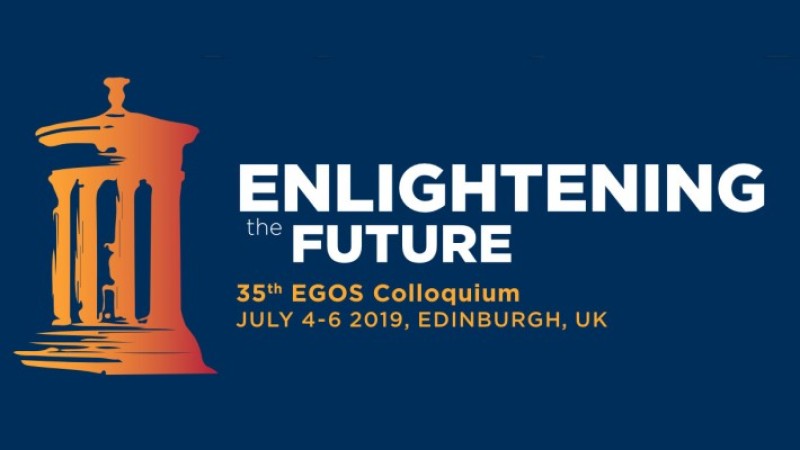Sub-theme 15: ‘Faking It’: Identity Work in an Age of Exclusion
Call for Papers
In keeping with the theme of the EGOS Colloquium 2019, that organizing decisions appear to be determined by who can appeal
effectively through assertion, assumption and even abuse, it is timely to consider how reason and respect have been abandoned
in processes of exclusion. Identity work around fitting-in requires further scholarly attention to understand how we tolerate
and organize difference.
Organizational processes and practices can enable or constrain the identities available
to individuals within organizations (Alvesson et al., 2008; Grey, 1994; Thomas & Davies, 2005; Ybema et al., 2009). Specific
consequences that result from the reciprocal interplay between identity work and organizational processes are influenced by
broader institutional contexts. Exploring what identities are recognised, tolerated, stigmatized or rejected in certain contexts
contributes to our understanding of organizational processes of inclusion and exclusion. It allows exploration of what happens
when people experience dissonance, are made to feel different and feel that they have to’ fake it’ to be part of an organization.
There are many ways that learning to be different in organizations may be theorised, which include (but are not limited to)
hermeneutics, reflexivity, process theories, post-colonialism, feminist perspectives, queer theory, and psycho-analytic perspectives.
These multiple perspectives offer potential for this conference stream to disrupt accepted narratives about, socialization
and identity work based on the experiences of those with dominant, normative identities.
In this stream we
want to further develop our understanding of the constructed, relational and situational characteristics of identity practices
and processes (Coupland & Brown, 2012), which promote inclusion or exclusion. We are particularly interested in papers
that explore the entanglement of the discursive, material and symbolic. In keeping with the theme of the conference, we seek
papers that reflect on new ‘populist’ ways and implications for identity practices, processes and outcomes. We invite papers
that (inter alia) explore:
Identity outcomes. Studies of identity have tended to focus on processes without exploring outcomes, in particular, the costs and downsides of identity work have been under-researched (Brown, 2015). What are the political and material outcomes of discursive identity work? How can identity work help individuals cope with change, resist constraints and manage stigmatization? What are the implications of identity clashes and conflicts for individual and collective well-being?
Embodiment, materiality and identity. Acknowledging the embodied, sensory, individual in identity research is an important perspective which offers opportunities to explore how inclusion and exclusion may be enacted. How do identity categories such as age, race, sexuality and gender intersect? How do bodies demonstrate the material limits of identity work? What roles do material artefacts and other symbols play in identity work (Cutcher et al., 2017)?
Identity regulation. How do organizations seek to manage employee identities? How do employees manage their identities to conform to organizational expectations? What constraints are there on organizations’ efforts to manage employees? How do organizational processes contribute to the gendering of identity?
Identity transitions. Much attention has focused on issues of identity liminality, adaptation and transition (e.g., Beech, 2011). How do those who regard themselves as outsiders learn to ‘be’ in organizations? What is at risk when we cease to be ourselves at work? How do people transition into roles (e.g. into management roles) in different sets of circumstances, e.g. where they articulate feelings of ambivalence, or nostalgia, or regret?
Identity stigma and its management. How and why are ‘differences’ stigmatized? How do those with stigmatized identities manage them? What are the implications of such identities for organizations, and processes of learning?
Identity and reflexivity. How do organizational actors reflexively acknowledge the disciplinary processes of organizing? How do issues of reflexivity relate to processes of learning in the context of identity formation?
Identity and recognition. What are the consequences of conforming to organizational norms in order to be recognized as ‘good’ workers, and what is the impact on those who cannot, or choose not to, conform? How are people’s identities negotiated, confirmed and contested in interactions with others and what are the implications of these processes for organizations?
References
- Alvesson, M., Ashcraft, K.K., & Thomas, R. (2008): “Identity matters: Reflections on the construction of identity scholarship in organization studies.” Organization, 15, 5–28.
- Beech, N. (2011): “Liminality and the practices of identity reconstruction.” Human Relations, 64, 285–302.
- Brown, A.D. (2015): “Identities and identity work in organizations.” International Journal of Management Reviews, 17, 20–40.
- Coupland, C., & Brown, A.D. (2012): “Identities in action: Processes and outcomes.” Scandinavian Journal of Management, 28, 1, 1–4.
- Cutcher, L., Dale, K., & Tyler, M. (2017): “‘Remembering as Forgetting’: Organizational commemoration as a politics of recognition.” Organization Studies, first published online on November 1, 2017, http://journals.sagepub.com/doi/full/10.1177/0170840617727776.
- Grey, C. (1999): “Career as a project of the self and labour process discipline.” Sociology, 28, 479–497.
- Thomas, R., & Davies, A. (2005): “Theorizing the micro-politics of resistance: New public management and managerial identities in the UK public services.” Organization Studies, 26, 683–706.
- Ybema, S. Keenoy, T. Oswick, C. Beverungen, A. Ellis, N., & Sabelis, I. (2009): „Articulating identities.” Human Relations, 62, 299–322.


